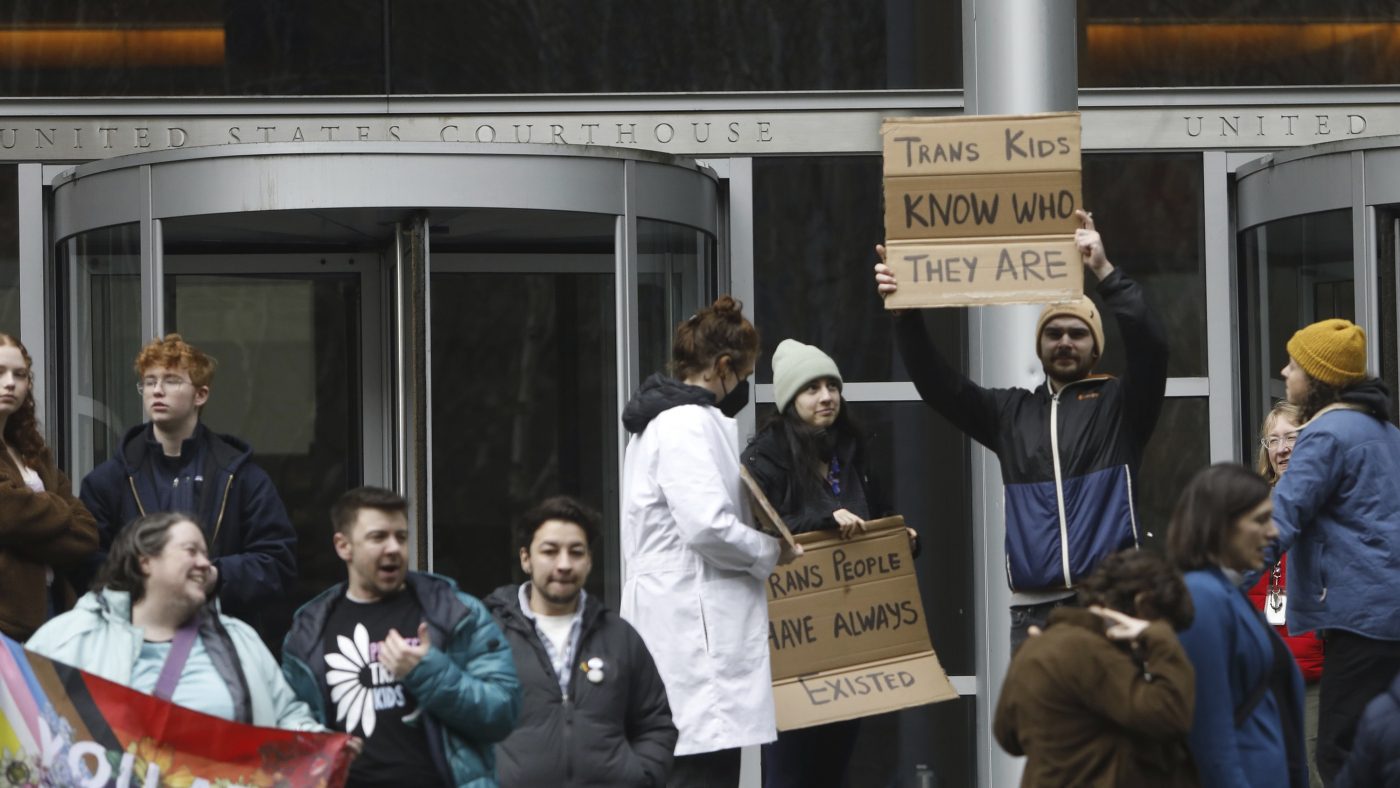

Crowds celebrate outside a federal courthouse in Seattle after a second federal judge temporarily halted President Trump’s directive concerning gender-affirming healthcare for minors.
Manuel Valdes/AP
hide caption
toggle caption
Manuel Valdes/AP
SEATTLE — On Friday, a second federal judge put a pause on President Donald Trump’s executive order that halted federal funding for gender-affirming care for individuals under 19.
U.S. District Court Judge Lauren King issued a temporary restraining order after the Democratic attorneys general from Washington, Oregon, and Minnesota filed a lawsuit against the Trump administration last week. Three physicians also participated as plaintiffs in this case, which was submitted to the Western District of Washington.
This decision follows a day after another federal judge in Baltimore temporarily blocked Trump’s order in response to a different lawsuit representing families with transgender or nonbinary children. Judge Brendan Hurson’s temporary restraining order will last for 14 days, with possibilities for extension, effectively placing Trump’s order on hold while the case moves forward. Notably, both judges were appointed by former President Joe Biden.
Last month, Trump enacted an executive order that halted federal funding to facilities providing such healthcare, and directed federal insurance programs, including Medicaid and TRICARE for military families, to exclude it from their coverage. The order also compels the Department of Justice to seek legal action and legislative measures in opposition.
Some state Medicaid programs still encompass gender-affirming treatments. However, Trump’s directive raises concerns about potentially terminating this practice, targeting institutions that receive federal funding and offer these services.
In the Seattle lawsuit, the three Democratic attorneys general argue that the executive order infringes upon equal rights protections, breaches the separation of powers, and undermines states’ rights to regulate matters not explicitly assigned to the federal government.
The Trump administration contested these claims in legal submissions, asserting, “The President’s authority to direct subordinate agencies to enact his agenda, while respecting those agencies’ statutory authorities, is well established,” said attorneys from the Justice Department.
A significant number of individuals gathered at the federal courthouse to observe Friday’s proceedings. Many outside carried signs with messages such as “Protect Trans Kids” and waved Pride flags labeled “You are loved.”
“Over 100 declarants shared personal testimonies regarding the impacts of this unlawful, unconstitutional, and harmful order, and their courage allowed for justice to be served today,” said Washington Attorney General Nick Brown following the ruling.
The temporary restraining order represents an initial step in a lengthy legal battle, Brown noted, expressing hope that it assures healthcare providers in the state they can continue to offer gender-affirming care to their patients.
Referring to the judge’s ruling, third-year medical student Natalie Koconis expressed that her reaction was one of relief. She was part of a group of medical students and doctors holding signs outside the courthouse, asserting that Trump’s executive order has had detrimental effects on their capacity to provide care to transgender youth. “All we wish for is that everyone receives the care they require and deserve,” Koconis stated.
Aside from the healthcare access orders and establishing immutable definitions of gender, Trump has also implemented regulations that could lead to barring transgender individuals from military service, changed guidelines on how schools address gender topics, and aimed to prohibit transgender athletes from competing in women’s sports.
Legal actions have already been initiated against the military directive, the proposal to transfer transgender women in federal facilities to men’s institutions, and the limitation of gender representation solely to birth-assigned sex, resulting in the stoppage of gender marker changes on passports.
Additional lawsuits are anticipated, much like the numerous challenges to various Trump policies.
As transgender individuals have become more visible and accepted in some areas, there has been significant backlash, with at least 26 states passing laws to restrict or prohibit gender-affirming care for minors. The U.S. Supreme Court reviewed arguments last year but has yet to issue a ruling on the constitutionality of Tennessee’s ban on such care.












